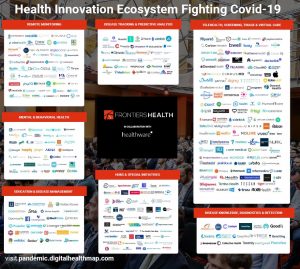 The COVID-19 global outbreak brought government organizations together to address digital health with increased urgency. Many patients have found themselves unable to see doctors or receive normal medical care for fear of overwhelming the health system or potentially exacerbating the pandemic. At the outset of this crisis, key health care stakeholders have renewed interest in technologies and initiatives that can provide concrete solutions to mitigate the pandemic, ushering in a new wave of telehealth. As Healthcare organizations are advising people to stay home unless they require urgent medical attention, and are recommending virtual treatment options instead, the entire health innovation ecosystem is fully committed to deploy valuable digital health tools and services to fight the coronavirus.
The COVID-19 global outbreak brought government organizations together to address digital health with increased urgency. Many patients have found themselves unable to see doctors or receive normal medical care for fear of overwhelming the health system or potentially exacerbating the pandemic. At the outset of this crisis, key health care stakeholders have renewed interest in technologies and initiatives that can provide concrete solutions to mitigate the pandemic, ushering in a new wave of telehealth. As Healthcare organizations are advising people to stay home unless they require urgent medical attention, and are recommending virtual treatment options instead, the entire health innovation ecosystem is fully committed to deploy valuable digital health tools and services to fight the coronavirus.
In pure Frontiers Health spirit, we vetted some of the most active players globally as scale-up and start-up companies, hubs, large corporations, institutions, acceleration programs, and shaped a landscape with the aim to strengthen the value and impact of digital health, improve coordination, and facilitate cooperation and scale.
We’ve worked to make the map as comprehensive and accurate as possible, by identifying various areas of intervention health innovators have been working in. This map has been created in collaboration with our conference co-host, Healthware Group, and also thanks to the huge knowledge base provided by our partners worldwide. Healthware also designed an easy-to-use intuitive interactive version of the map.
We believe the demand for digital health and telehealth solutions will continue to grow rapidly and virtual care will be more and more pivotal, as people and health care professionals will continue to rely on telemedicine whenever possible. As one of the leading health innovation platforms, we at Frontiers Health will continue to connect the multifaceted ecosystem to capitalize on the vast amount of available solutions.

